研究生英语精读教程第三版上unitone原文
(完整版)研究生英语阅读教程第三版课文Lesson1
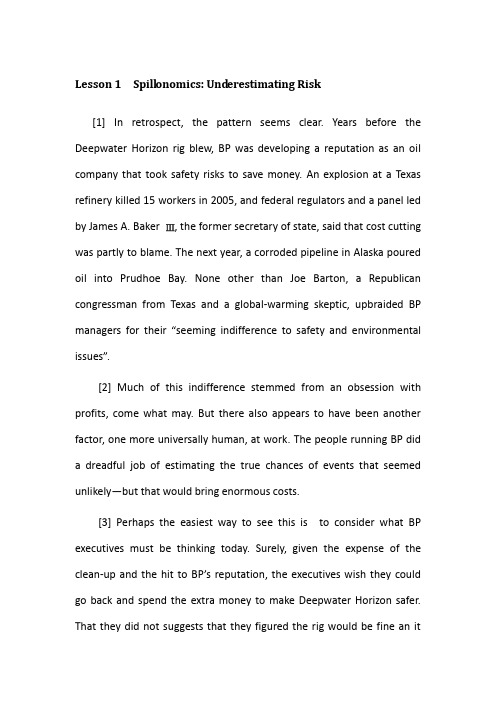
Lesson 1 Spillonomics: Underestimating Risk[1] In retrospect, the pattern seems clear. Years before the Deepwater Horizon rig blew, BP was developing a reputation as an oil company that took safety risks to save money. An explosion at a Texas refinery killed 15 workers in 2005, and federal regulators and a panel led by James A. BakerⅢ, the former secretary of state, said that cost cutting was partly to blame. The next year, a corroded pipeline in Alaska poured oil into Prudhoe Bay. None other than Joe Barton, a Republican congressman from Texas and a global-warming skeptic, upbraided BP managers for their “seeming indifference to safety and environmental issues”.[2] Much of this indifference stemmed from an obsession with profits, come what may. But there also appears to have been another factor, one more universally human, at work. The people running BP did a dreadful job of estimating the true chances of events that seemed unlikely—but that would bring enormous costs.[3] Perhaps the easiest way to see this is to consider what BP executives must be thinking today. Surely, given the expense of the clean-up and the hit to BP’s reputation, the executives wish they could go back and spend the extra money to make Deepwater Horizon safer. That they did not suggests that they figured the rig would be fine an itwas.[4]For all the criticism BP executives may deserve, they are far from the only people to struggle with such low-probability, high-cost events. Nearly everyone does. “These are precisely the kinds of events that are hard for us as humans to get our hands around and react to rationally, ”Robert N. Stavins, an environmental economist at Harvard, says. We make two basic—and opposite—types of mistakes. When an event is difficult to imagine, we tend to underestimate its likelihood. This is the proverbial black swan. Most of the people running Deepwater Horizon probably never had a rig explode on them. So they assumed it would not happen , at least not to them.[5] Similarly, Ben Bernanke and Alan Greenspan liked to argue, not so long ago, that the national real estate market was not in a bubble because it had never been in one before. Wall Street traders took the same view and built mathematical models that did not allow for the possibility that house prices would decline. And may home buyers signed up for unaffordable mortgages, believing they could refinance or sell the house once its price rose. That’s what house prices did, it seemed.[6]On the other hand, when an unlikely event is all too easy to imagine, we often go in the opposite direction and overestimate the odds. After the 9/11 attacks, Americans canceled plane trips and took to the road. There were no terrorist attacks in this country in 2002, yet theadditional driving apparently led to an increase in traffic fatalities.[7]When the stakes are high enough, it falls to government to help its citizens avoid these entirely human errors. The market, left to its own devices, often cannot do so. Yet in the case of Deepwater Horizon, government policy actually went the other way. It encouraged BP to underestimate the odds of a catastrophe.[8] In a little-noticed provision in a 1990 law passed after the Exxon Valdez spill, Congress capped a spiller’s liability over and above cleanup costs at $7500 million for a rig spill. Even if the party is on the hook for only $7500 million. (In this instance, BP has agreed to waive the cap for claims it deems legitimate. ) Michael Greenstone, an M.I.T. economist who runs the Hamilton Project in Washington, says the law fundamentally distorts a company’s decision making. Without the cap, executives would have to weigh the possible revenue from a well against the cost of drilling there and the risk of damage. With the cap, they can largely ignore the potential damage beyond cleanup costs. So they end up drilling wells even in places where the damage can be horrific, like close to a shoreline. To put it another way, human frailty helped BP’s executives underestimate the chance of a low-probability, high-cost event. Federal law helped them underestimate the costs.[9] In the wake of Deepwater Horizon, Congress and Obama administration will no doubt be tempted to pass laws meant to reducethe risks of another deep-water disaster. Certainly there are some sensible steps they can take, like lifting the liability cap and freeing regulators from the sway of industry. But it would be foolish to think that the only risks we are still underestimating are the ones that have suddenly become salient.[10]The big financial risk is no longer a housing bubble. Instead, it may be the huge deficits that the growth of Medicare, Medicaid and Social Security will cause in coming years—and the possibility that lender will eventually become nervous about extending credit to Washington. True, some economists and policy makers insist the country should not get worked up about this possibility, because lenders have never soured on the Unite States government before and show no signs of doing so now. but isn’t that reminiscent of the old Bernanke-Greenspan tune about the housing market?[11]Then, of course, there are the greenhouse gases that oil wells ( among other things) send into the atmosphere even when the wells function properly. Scientists say the buildup of these gases is already likely to warm the planet by at least three degrees over the next century and cause droughts, storms and more ice-cap melting. The researcher’s estimates have risen recently, too, and it is also possible the planet could get around 12 degree hotter. That kind of could flood major cities and cause parts of Antarctica to collapse.[12]Nothing like that has ever happened before. Even imagining it is difficult. It is much easier to hope that the odds of such an outcome are vanishingly small. In fact, it’s only natural to have this hope. But that doesn’t make it wise.。
外教社大学英语精读第三册unit1原文+翻译+课后翻译
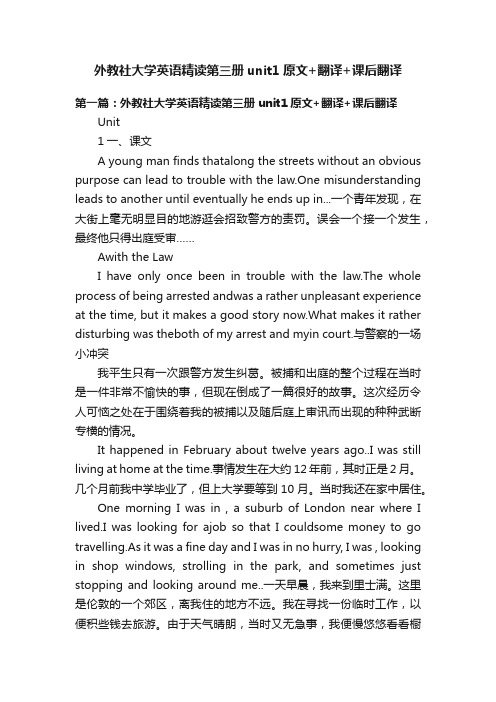
外教社大学英语精读第三册unit1原文+翻译+课后翻译第一篇:外教社大学英语精读第三册unit1原文+翻译+课后翻译Unit1一、课文A young man finds thatalong the streets without an obvious purpose can lead to trouble with the law.One misunderstanding leads to another until eventually he ends up in...一个青年发现,在大街上毫无明显目的地游逛会招致警方的责罚。
误会一个接一个发生,最终他只得出庭受审……Awith the LawI have only once been in trouble with the law.The whole process of being arrested andwas a rather unpleasant experience at the time, but it makes a good story now.What makes it rather disturbing was theboth of my arrest and myin court.与警察的一场小冲突我平生只有一次跟警方发生纠葛。
被捕和出庭的整个过程在当时是一件非常不愉快的事,但现在倒成了一篇很好的故事。
这次经历令人可恼之处在于围绕着我的被捕以及随后庭上审讯而出现的种种武断专横的情况。
It happened in February about twelve years ago..I was still living at home at the time.事情发生在大约12年前,其时正是2月。
几个月前我中学毕业了,但上大学要等到10月。
当时我还在家中居住。
One morning I was in , a suburb of London near where I lived.I was looking for ajob so that I couldsome money to go travelling.As it was a fine day and I was in no hurry, I was , looking in shop windows, strolling in the park, and sometimes just stopping and looking around me..一天早晨,我来到里士满。
研究生英语阅读教程第三版lesson1翻译

1.英语是个杀手。
正是英语造成了康瑞克,康尼施,诺恩和曼科斯语的消亡。
这些岛上仍然有相当多的群体使用英语到来之前就已经存在的语言。
然而英语在日常生活中无处不在,所有人或者说几乎所有人都懂英语,英语对现存的三种凯尔特语——爱尔兰语,苏格兰盖尔语和威尔士语的威胁如此之大,以至于它们的未来岌岌可危。
2.同时,他认为这样的政策带有蔑视色彩,他称之为语言歧视(和种族歧视和
性别歧视类似)。
在菲利普森看来,在占主导的白人英语的世界里,处于领导地位的机构和个人(有意或无意的)鼓励或至少是容忍——当然没有反对——英语霸权主义的传播。
它开始于三世纪前,为了经济和殖民的扩张。
3.总的来说,我们现在或多或少认为它们是有利的,而且经常以崇敬和赞赏的
心态去谈论与它们相关的文化和它们为世界所做的贡献。
这么做也没有什么风险,因为这些语言现在已不构成什么威胁。
4.然而许多人把英语看做一种福。
在此,我暂且不谈世界上任何一种语言都具
有的明显的优势,例如广泛的交流网络,强大的文化传媒体系,以及强有力地文化教育机构。
5.讲英语的英国血统的南非人并不强烈反对种族隔离政权,并且由多种语言成
员构成的黑人反对力量,起初很脆弱,同时也缺乏组织。
6.这一象征表明世界通用语的使用者应充分发掘这个福给我们带来的好处,同
时也要尽可能的去避免招致灾祸。
研究生英语精读教程教师参考书(第三版上)一至八单元课件

Optimism/pessimism
Optimism
n. optimistic a. optimist n. Pessimism n. pessimistic a. pessimist n.
Inoculate against 预防注射;接种疫苗
e.g.---During the war allied troops were inoculated against diseases, because of fears that biological weapons might be used. All children are inoculated against polio. (小儿麻痹症)
ill:
In
Para.2: Optimism can help you to be… Pessimism leads you to…
Topic of the article
In Para. 7 When they failed on the first call or two…
(two weeks for one unit, so we can probably finish 8 units) Examination (mainly based on what is taught in class)
Requirements
Preview
Active
participation Feedback
Para. 2
body:
A number of persons, concepts, or things regarded as a group视作一组的人、 事、物 ---He has a large body of facts to prove his statements.
研究生英语系列教材上unit1-原文+翻译(1)
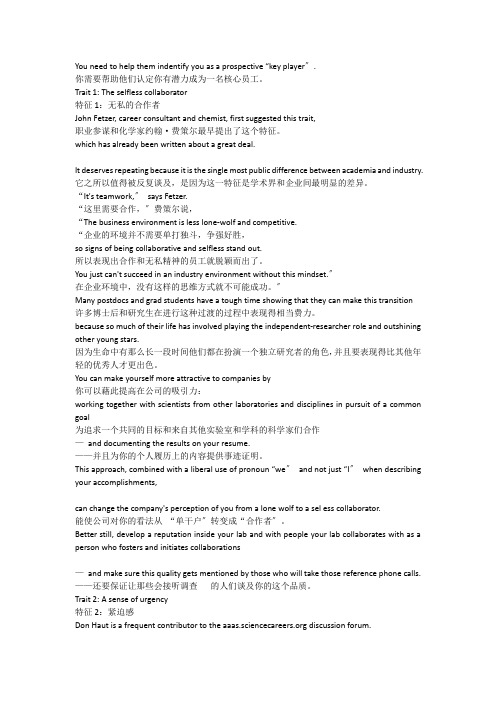
You need to help them indentify you as a prospective “key player〞.你需要帮助他们认定你有潜力成为一名核心员工。
Trait 1: The selfless collaborator特征1:无私的合作者John Fetzer, career consultant and chemist, first suggested this trait,职业参谋和化学家约翰·费策尔最早提出了这个特征。
which has already been written about a great deal.It deserves repeating because it is the single most public difference between academia and industry.它之所以值得被反复谈及,是因为这一特征是学术界和企业间最明显的差异。
“It's teamwork,〞says Fetzer.“这里需要合作,〞费策尔说,“The business environment is less lone-wolf and competitive.“企业的环境并不需要单打独斗,争强好胜,so signs of being collaborative and selfless stand out.所以表现出合作和无私精神的员工就脱颖而出了。
You just can't succeed in an industry environment without this mindset.〞在企业环境中,没有这样的思维方式就不可能成功。
〞Many postdocs and grad students have a tough time showing that they can make this transition许多博士后和研究生在进行这种过渡的过程中表现得相当费力。
研究生英语系列教材上unit1-原文+翻译
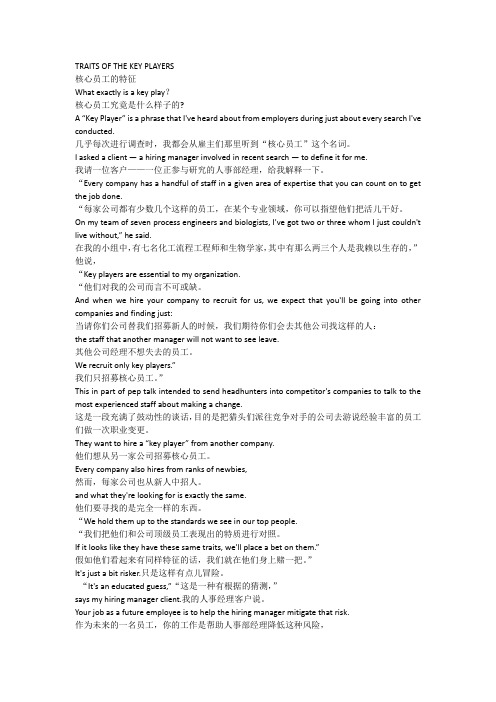
TRAITS OF THE KEY PLAYERS核心员工的特征What exactly is a key play?核心员工究竟是什么样子的?A “Key Player” is a phrase that I've heard about from employers during just about every search I've conducted.几乎每次进行调查时,我都会从雇主们那里听到“核心员工”这个名词。
I asked a client — a hiring manager involved in recent search — to define it for me.我请一位客户——一位正参与研究的人事部经理,给我解释一下。
“Every company has a handful of staff in a given area of expertise that you can count on to get the job done.“每家公司都有少数几个这样的员工,在某个专业领域,你可以指望他们把活儿干好。
On my team of seven process engineers and biologists, I've got two or three whom I just couldn't live without,” he said.在我的小组中,有七名化工流程工程师和生物学家,其中有那么两三个人是我赖以生存的,”他说,“Key players are essential to my organization.“他们对我的公司而言不可或缺。
And when we hire your company to recruit for us, we expect that you'll be going into other companies and finding just:当请你们公司替我们招募新人的时候,我们期待你们会去其他公司找这样的人:the staff that another manager will not want to see leave.其他公司经理不想失去的员工。
(完整版)研究生英语阅读教程第三版课文Lesson1

Lesson 1 Spillonomics: Underestimating Risk[1] In retrospect, the pattern seems clear. Years before the Deepwater Horizon rig blew, BP was developing a reputation as an oil company that took safety risks to save money. An explosion at a Texas refinery killed 15 workers in 2005, and federal regulators and a panel led by James A. BakerⅢ, the former secretary of state, said that cost cutting was partly to blame. The next year, a corroded pipeline in Alaska poured oil into Prudhoe Bay. None other than Joe Barton, a Republican congressman from Texas and a global-warming skeptic, upbraided BP managers for their “seeming indifference to safety and environmental issues”.[2] Much of this indifference stemmed from an obsession with profits, come what may. But there also appears to have been another factor, one more universally human, at work. The people running BP did a dreadful job of estimating the true chances of events that seemed unlikely—but that would bring enormous costs.[3] Perhaps the easiest way to see this is to consider what BP executives must be thinking today. Surely, given the expense of the clean-up and the hit to BP’s reputation, the executives wish they could go back and spend the extra money to make Deepwater Horizon safer. That they did not suggests that they figured the rig would be fine an itwas.[4]For all the criticism BP executives may deserve, they are far from the only people to struggle with such low-probability, high-cost events. Nearly everyone does. “These are precisely the kinds of events that are hard for us as humans to get our hands around and react to rationally, ”Robert N. Stavins, an environmental economist at Harvard, says. We make two basic—and opposite—types of mistakes. When an event is difficult to imagine, we tend to underestimate its likelihood. This is the proverbial black swan. Most of the people running Deepwater Horizon probably never had a rig explode on them. So they assumed it would not happen , at least not to them.[5] Similarly, Ben Bernanke and Alan Greenspan liked to argue, not so long ago, that the national real estate market was not in a bubble because it had never been in one before. Wall Street traders took the same view and built mathematical models that did not allow for the possibility that house prices would decline. And may home buyers signed up for unaffordable mortgages, believing they could refinance or sell the house once its price rose. That’s what house prices did, it seemed.[6]On the other hand, when an unlikely event is all too easy to imagine, we often go in the opposite direction and overestimate the odds. After the 9/11 attacks, Americans canceled plane trips and took to the road. There were no terrorist attacks in this country in 2002, yet theadditional driving apparently led to an increase in traffic fatalities.[7]When the stakes are high enough, it falls to government to help its citizens avoid these entirely human errors. The market, left to its own devices, often cannot do so. Yet in the case of Deepwater Horizon, government policy actually went the other way. It encouraged BP to underestimate the odds of a catastrophe.[8] In a little-noticed provision in a 1990 law passed after the Exxon Valdez spill, Congress capped a spiller’s liability over and above cleanup costs at $7500 million for a rig spill. Even if the party is on the hook for only $7500 million. (In this instance, BP has agreed to waive the cap for claims it deems legitimate. ) Michael Greenstone, an M.I.T. economist who runs the Hamilton Project in Washington, says the law fundamentally distorts a company’s decision making. Without the cap, executives would have to weigh the possible revenue from a well against the cost of drilling there and the risk of damage. With the cap, they can largely ignore the potential damage beyond cleanup costs. So they end up drilling wells even in places where the damage can be horrific, like close to a shoreline. To put it another way, human frailty helped BP’s executives underestimate the chance of a low-probability, high-cost event. Federal law helped them underestimate the costs.[9] In the wake of Deepwater Horizon, Congress and Obama administration will no doubt be tempted to pass laws meant to reducethe risks of another deep-water disaster. Certainly there are some sensible steps they can take, like lifting the liability cap and freeing regulators from the sway of industry. But it would be foolish to think that the only risks we are still underestimating are the ones that have suddenly become salient.[10]The big financial risk is no longer a housing bubble. Instead, it may be the huge deficits that the growth of Medicare, Medicaid and Social Security will cause in coming years—and the possibility that lender will eventually become nervous about extending credit to Washington. True, some economists and policy makers insist the country should not get worked up about this possibility, because lenders have never soured on the Unite States government before and show no signs of doing so now. but isn’t that reminiscent of the old Bernanke-Greenspan tune about the housing market?[11]Then, of course, there are the greenhouse gases that oil wells ( among other things) send into the atmosphere even when the wells function properly. Scientists say the buildup of these gases is already likely to warm the planet by at least three degrees over the next century and cause droughts, storms and more ice-cap melting. The researcher’s estimates have risen recently, too, and it is also possible the planet could get around 12 degree hotter. That kind of could flood major cities and cause parts of Antarctica to collapse.[12]Nothing like that has ever happened before. Even imagining it is difficult. It is much easier to hope that the odds of such an outcome are vanishingly small. In fact, it’s only natural to have this hope. But that doesn’t make it wise.。
大学英语精读第三版第三册unit1-unit3课文翻译
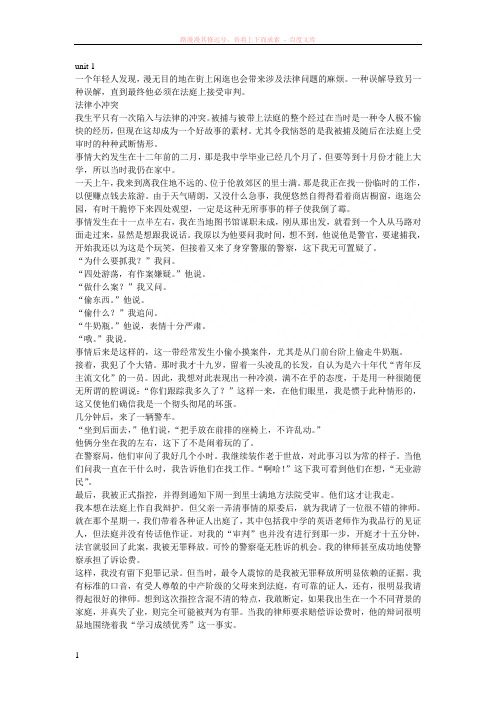
“为什么要抓我?”我问。
“四处游荡,有作案嫌疑。”他说。
“做什么案?”我又问。
学生们必须上网。你们家必须用数码与环球信息网联通。企业必须能即时下载大量资料。但是,除非我们改变范式、重新审视相关的各种因素,否则,信息高速公路就不会给我们带来什么结果。
无论是现在还是最近,我们都不缺乏信息。试想我们拥有的信息比四面年前的哥白尼多了多少。但他作出了足以震撼全球的(权作双关语)惊人之举,完全改变了人们对宇宙的看法。他作出此举不是靠发现更多的信息,而是靠用不同的眼光看大家都看到过的信息。爱德华·詹纳不是靠积累信息发明了预防药物,而是靠重新表述问题。
我本想在法庭上作自我辩护。但父亲一弄清事情的原委后,就为我请了一位很不错的律师。就在那个星期一,我们带着各种证人出庭了,其中包括我中学的英语老师作为我品行的见证人,但法庭并没有传话他作证。对我的“审判”也并没有进行到那一步,开庭才十五分钟,法官就驳回了此案,我被无罪释放。可怜的警察毫无胜诉的机会。我的律师甚至成功地使警察承担了诉讼费。
几分钟后,来了一辆警车。
“坐到后面去,”他们说,“把手放在前排的座椅上,不许乱动。”
他俩分坐在我的左右,这下了不是闹着玩的了。
在警察局,他们审问了我好几个小时。我继续装作老于世故,对此事习以为常的样子。当他们问我一直在干什么时,我告诉他们在找工作。“啊哈!”这下我可看到他们在想,“无业游民”。
最后,我被正式指控,并得到通知下周一到里士满地方法院受审。他们这才让我走。
- 1、下载文档前请自行甄别文档内容的完整性,平台不提供额外的编辑、内容补充、找答案等附加服务。
- 2、"仅部分预览"的文档,不可在线预览部分如存在完整性等问题,可反馈申请退款(可完整预览的文档不适用该条件!)。
- 3、如文档侵犯您的权益,请联系客服反馈,我们会尽快为您处理(人工客服工作时间:9:00-18:30)。
Unit OneText:You Are What You ThinkAnd if you change your mind-from pessimism tooptimism-you can change your lifeClaipe Safran[1] Do you see the glass as half full rather than half empty? Do you keep your eye upon the doughnut, not upon the hole? S uddenly these clichés are scientific questions, as researchers scrutinize the power of positive thinking.[2] A fast-growing body of research—104 studies so far, involving some 15,000 people—is proving that optimism can help you to be happier, healthier and more successful. Pessimism leads, by contrast, to hopelessness, sickness and failure, and is linked to depression, loneliness and painful shyness. "If we could teach people to think more positively," says psychologist Craig A. Anderson of Rice Universit y① in Houston②,"it would be like inoculating them againstthese mental ills."[3] "Your abilities count," explains psychologist Michael F. Scheier of Carnegie Mellon University③ in Pittsburgh④, "but the belief that you can succeed affects whether or not you will." In part , that's because optimists and pessimists deal with the same challenges and disappointments in very different ways.[4] Take, for example, your job. In a major study, psychologist Martin E. P. Seligman of the University of Pennsylvania⑤and colleague Peter Schulman surveyed sales representatives at the Metropolitan Life Insurance Co. They found that the positive-thinkers among longtime representatives sold 37-percent more insurance than did the negative-thinkers. Of newly hired representatives, optimists sold 20-percent more.[5] Impressed, the company hired 100 people who had failed the standard industry test⑥ but had scored high on optimism. These people, who might never have been hired, sold 10 percent more insurance than did the average representative.[ 6 ] How did they do it? The secret to an optimist's success, according to Seligman, is in his "explanatory style". When things go wrong the pessimist tends to blame himself. "I'm no good at this, " he says, "I always fail." The optimist looks for loopholes. He blames the weather, the phone connection, even the other person. That customer was in a bad mood, he thinks. When things go right, the optimist takes credit while the pessimist sees success as a fluke. [ 7 ] Craig Anderson had a group of students phone strangers and ask them to donate blood to the Red Cross⑦. When they failed on the first call or two, pessimists said, "I can't do this." Optimists told themselves, "I need to try a different approach."[ 8 ] Negative or positive, it was a self-fulfilling prophecy. "If people feel hopeless, "says Anderson, "they don't bother to acquire the skills they need to succeed."[9] A sense of control, according to Anderson, is the litmus test⑧ for success. The optimist feels in control of his own life. If things are going badly, he acts quickly, looking for solutions, forming a new plan ofaction, and reaching out for advice. The pessimist feels like fate's plaything and moves slowly. He doesn't seek advice, since he assumes nothing can be done.[ 10 ] Optimists may think they are better than the facts would justify—and sometimes that's what keeps them alive. Dr. Sandra Levy of the Pittsburgh Cancer Institute studied women with advanced breast cancer. For the women who were generally optimistic, there was a longer disease-free interval, the best predictor of survival. In a pilot study of women in the early stages of breast cancer, Dr. Levy found the disease recurred sooner among the pessimists.[ 11 ] Optimism won't cure the incurable, but it may prevent illness. In a long term study, researchers examined the health histories of a group of Harvard graduates, all of whom were in the top half of their class and in fine physical condition. Yet some were positive thinkers, and some negative. Twenty years later, there were more middle-age diseases—hypertension, diabetes, heart ailments —among the pessimists than the optimists.[ 12 ] Many studies suggest that the pessimist's feeling of helplessness undermines the body's natural defenses, the immune system. Dr. Christopher Peterson of the University of Michigan⑨has found that the pessimist doesn't take good care of himself. Feeling passive and unable to dodge life's blows, he expects ill health and other misfortunes, no matter what he does. He munches on junk food⑩,avoids exercise, ignores the doctor, has another drink.[ 13 ] Most people are a mix of optimism and pessimism, but are inclined in one direction or the other. It is a pattern of thinking learned “at your mother‘s knee”,says Seligman. It grows out of thousands of cautions or encouragements, negative statements or positive ones. Too many “don’ts” and warnings of danger can make a child feel incompetent, fearful—and pessimistic.[ 14 ] As they grow, children experience small triumphs, such as learning to tie shoelaces. Parents can help turn these successes into a sense of control, and that breeds optimism.[ 15 ] Pessimism is a hard habit to break—but it canbe done. In a series of landmark studies, Dr. Carol Dweck11of the University of Illinois12has been working with children in the early grades of school. As she helps floundering students to change the explanations for their failures—from "I must be dumb" to "I didn't study hard enough“—their academic performance improves.[ 16 ] Pittsburgh's Dr. Levy wondered if turning patients into optimists would lengthen their lives. In a pilot study, two groups of colon-cancer patients were given the same medical treatment, but some were also given psychological help to encourage optimism. Results showed that this worked. Now a major study is planned to determine whether this psychological change can alter the course of the disease.[ 17 ] So, if you're a pessimist, there's reason for optimism. You can change. Here's how, says Steve Hollon, a psychologist at Vanderbilt University13: [ 18 ] 1. Pay careful attention to your thoughts when bad things happen. Write down the first thing that comes to mind, unedited and uncensored[ 19 ] 2. Now try an experiment. Do something that'scontrary to any negative reactions. Let's say something has gone wrong at work. Do you think, I hate my job, but I could never get a better one? Act as if that weren't so. Send out resumés. Go to interviews. Look into training and check job leads[ 20 ] 3. Keep track of what happens. Were your first thoughts right or wrong? "If your thoughts are holding you back, change them," says Hollon. "It's trial and error, no guarantees, but give yourself a chance."[ 21 ] Positive thinking leads to positive action, and reaction. What you expect from the world, the evidence suggests, is what you're likely to get..。
